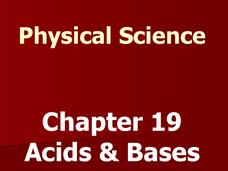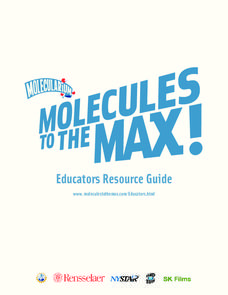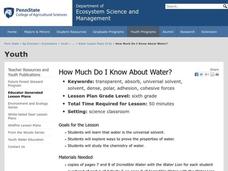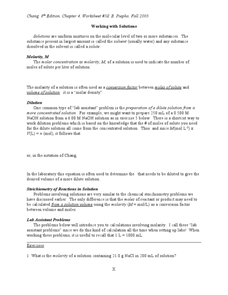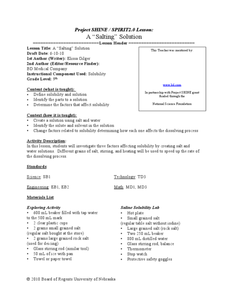Curated OER
Solutions
In this solutions worksheet, students answer 18 questions about solutions, saturation of solutions, solvents and solubility.
Curated OER
Paper Chromatography-Chemical and Mechanical
Students perform paper chromatography to determine pigments in plants. In this paper chromatography lesson plan, students isolate leaf pigments, prepare a chromatogram and place their chromatogram in a solvent to separate the pigments....
Mr. E. Science
Acids, Bases and Solutions
If you are not part of the solution, then you are part of the precipitate. The presentation covers solutions, suspensions, solubility, dissociation, and acid/base reactions. This is the 19th lesson in a series of 26.
Virginia Department of Education
Solution Concentrations
What happens when you combine 6.022 times 10 to the 23 piles of dirt into one? You make a mountain out of a mole hill. Scholars use dehydration to obtain percent composition and then calculate the molarity of the original solution.
Virginia Department of Education
Laboratory Safety and Skills
Avoiding lab safety rules will not give you super powers. The lesson opens with a demonstration of not following safety rules. Then, young chemists practice their lab safety while finding the mass of each item in a mixture and trying to...
SRI International
Science of Water
Water is crucial to survival. Scholars gain an appreciation for water by reading about it, learning about its atomic properties, and investigating its properties through six stations in a lab activity.
Teach Engineering
Chromatography Lab
Groups use alcohol and chromatography paper to separate the color components of black ink. The purpose of the activity is to allow the class to become aware that mixtures exist in hidden places.
Fuse School
Quiz: Emulsions
Ready to mix it up? Learners step up to the plate and show what they know in the 12th installment of a 14-part series covering the states of matter. The quiz contains four questions testing the basics of emulsion chemistry.
Rensselaer Polytechnic Institute
Molecules to the Max!—Educators Resource Guide
From molecules to nanotubes, an engaging unit explores the world of tiny science. Fifteen hands-on experiments and lessons engage young scientists as they learn chemistry. Discussions, worksheets, and data analysis reinforce the concepts...
Beyond Benign
SLS Today
Lather is not necessary for an effective shampoo. After learning of the industry created consumer misinformation, individuals investigate the toxicity of the most popular additive in shampoos to create lather. They use their results to...
Beyond Benign
In a Lather
Time to come clean! Scholars continue preparing the shampoo they created in the previous two lessons. The purpose of this stage is to calculate the perfect amount of additive to make the shampoo lather.
Kenan Fellows
Solutions
Scientists require specific chemical solutions for their experiments. In the seventh and final installment in a series that integrates chemistry and algebra II, scholars learn to set up a system of equations to solve the volume of a...
American Chemical Society
All Wet
Sometimes liquids just don't get along together. A fun experiment has scholars determine whether various liquids dissolve in water. They pour isopropyl alcohol, vegetable oil, and corn syrup into cups of water to see which ones mix well...
American Chemical Society
Using Dissolving to Identify Substances
It's time to test observation and dissolving skills! After investigating the process of dissolving in previous lessons, pupils see if they can use their dissolving skills to identify substances. They dissolve known and unknown substances...
American Chemical Society
Dissolving and Back Again
From solid to liquid and then back again. Young scientists dissolve salt in water and then evaporate the water while observing what happens to the solute. They use their observations to make predictions about other solutions.
Curated OER
How Much Do I Know About Water?
Sixth graders explore ways to analyze the properties of water and examine the chemistry of water. In this water instructional activity students work in groups and complete several activities.
Curated OER
Working with Solutions
In this solutions worksheet, students review how molarity is calculated and how to prepare a dilute solution. This worksheet has 5 problems to solve.
Curated OER
Solutions Quiz Review Sheet
In this solutions activity, students use a phase diagram to determine the boiling point and molality of the solution. Students determine the electrical conductivity of a saturated solution. This activity has nine problems to solve.
Curated OER
Science: Quick Freeze
Learners observe an experiment of freezing point depression using club soda. Through observation, they note that the carbon dioxide molecules disrupt the capacity of the water molecules to solidify. Precautions must be taken to assure...
Curated OER
Molarity Worksheet
For this molarity worksheet, students fill in unknowns such as mass of solute, moles of solute, volume of solution and molarity of solution in a chart with given solvents. They also calculate the molarity of solutions in other problems.
Curated OER
Lab Safety Word Search
In this science worksheet, students locate and identify various vocabulary terms related to lab safety. There are 21 words/phrases located in the puzzle to find.
Curated OER
Study the Fizz
Students hypothesize about the amount of carbon dioxide in soda bottles. In this chemistry lesson plan, students design an experiment to solve the problem. They share findings in class.
Curated OER
Straw Chromatography
High schoolers separate food coloring using liquid chromatography. For this chemistry lesson, students explain the effects of different solvents on the rate of separation.
Curated OER
A “Salting” Solution
Ninth graders investigate the factors affecting solubility. In this chemistry lesson, 9th graders differentiate solvent and solute. They give examples of real world application of solutions.
Other popular searches
- Solutions Solvent Solute
- Solute Solvent
- Solvent and Solute
- Water Universal Solvent
- Solute and Solvents
- Solute and Solvent Lab
- Organic Solvents
- Solution, Solvent, Solute
- Solvent vs Solute
- Solutes and Solvents
- Universal Solvent
- Water Universal Solvent




